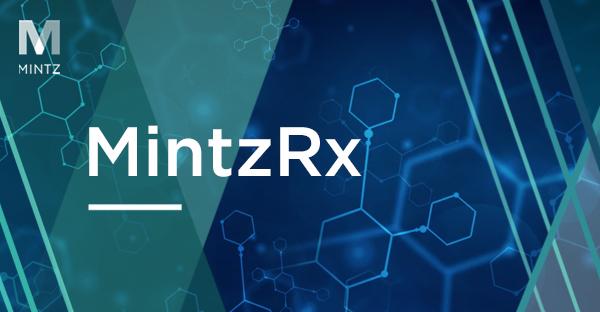MintzRx — Drug Pricing Update: The Inflation Reduction Act
As the long-standing battle over drug prices continues, Congress handed Health and Human Services (HHS) the authority to negotiate prices for certain Part D and B drugs and redesigned the Part D program with the passage of the Inflation Reduction Act of 2022 (IRA) (we provide a summary of the IRA on our blog).
With the passage of the IRA, what key changes and issues are we focusing on now?
1. Part D benefit and liability redesign
- In 2023, Plans must limit cost shares for a monthly supply of covered insulins to $35.
- In 2024, certain Low Income Subsidy (LIS) members who have only received partial subsidy benefits will become eligible for full LIS subsidies.
- In 2025, Plans must limit member out of pocket payments to $2,000 and allow members to spread such payments across the year.
- Centers for Medicare & Medicaid Services (CMS) will no longer be the primary insurer for catastrophic drug coverage as CMS passes that liability on to plan sponsors.
- Plan sponsors lose some control over their formularies for negotiated “selected drugs.”
- Plan sponsors have limited ability to increase premiums to absorb the cost of the increased liability that they are assuming, this is coupled with the change in how member cost shares are calculated for claims subject to post-point-of-sale pharmacy price concessions.
2. Need for significant re-contracting
- Assuming the negotiation of drug prices goes into effect as scheduled for plan year 2026, Plans, PBMs, pharmacies, and manufacturers will be considering/requesting/demanding changes to their current contracts.
- Rebate guarantees will likely change.
- Pharmacy brand effective pricing will likely change.
- Client agreements between PBMs and their plan clients will be adjusted based on updated rebate and pharmacy agreements.
3. Manufacturer pricing provisions
- In 2023, manufacturers of many single source drugs will be required to pay inflation protection payments to CMS if they increase their drug prices too quickly.
- The negotiation process for selected Part D drugs for plan year 2026 will begin in fourth quarter 2023.
- In 2028, Part B drugs will be subject to negotiation.
- The negotiation process, formulary requirement, and cost share limitation for selected drugs essentially applies the Trump Rebate Rule to such drugs.
4. How will “access” to a drug’s maximum fair price be operationalized?
- The statute requires access to be granted to Part D and B members, hospitals, physicians, and other providers and suppliers who are providing a drug that may be covered by Part B, but does not explain how such access will be granted.
5. Potential for legal challenges
- Medicare drug price negotiation begins in 2026, leaving plenty of time for challenges to the new law. A 2019 Congressional Research Service report outlined potential legal arguments against the IRA:
- Takings Clause under the Fifth Amendment: Pharmaceutical companies may argue that the government is unjustly taking the drugs, or applicable patents, during the Medicare negotiation process without compensation.
- Excessive Fines under the Eighth Amendment: Pharmaceutical companies might argue that taxing companies who choose not to participate in the Medicare negotiation process at a starting rate of 65% of the drug’s prior year sales, with a potential increase up to 95%, would constitute an “excessive fine.” Courts will look to see whether the tax is punitive and grossly disproportional to the company’s failure to participate.
- Judicial Review: Lawmakers have tried to shield the IRA from legal challenges by explicitly stating that courts may not review how Medicare (1) defines a “unit” of a drug, (2) chooses drugs for negotiation, or (3) determines negotiated prices. But, the door is still open to constitutional challenges, challenges to implementing regulations, and attempts to bend the negotiation process in favor of drug companies.
6. Higher drug prices in the commercial market or for to market drugs?
- Notably, the drug pricing reforms in the IRA are mainly restricted to Medicare drug prices. However, if the pharmaceutical industry is unsuccessful in challenging the law, there is a possibility drug companies will raise prices for drugs that are not selected for negotiation to compensate for losses under Medicare and also raise list prices for negotiated drugs in the commercial market. They may also raise the drug list prices to ensure that negotiation occurs at higher prices. They will have to balance this pricing strategy with the inflation protection payments.
While the IRA is expansive, it does not include all current drug pricing reform proposals. We will continue to monitor lawmakers’ efforts to curb drug costs and the response from the pharmaceutical industry.

